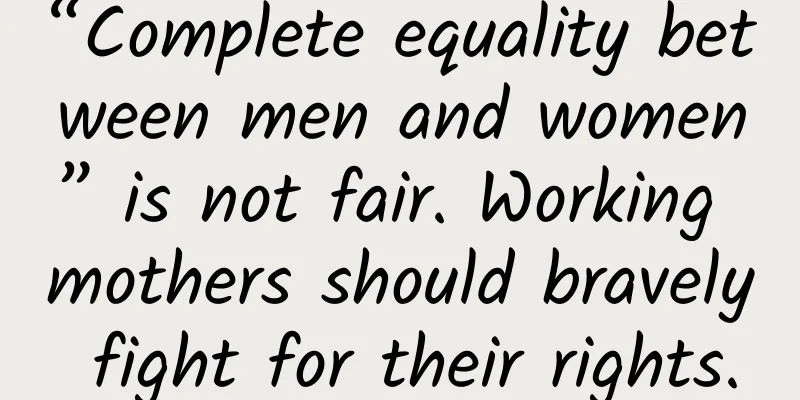“Complete equality between men and women” is not fair. Working mothers should bravely fight for their rights.

|
Yesterday, we published the first half of the content of the 7th Women in Science Forum. Professor Yan Ning, editor-in-chief of Fanpu, invited nine female graduate students and postdoctoral students from her laboratory to the forum to talk about their mental journey in facing difficulties during their doctoral studies and their careful considerations in choosing their careers. Today's article records the content of the second half of the forum, discussing the issues of gender equality and age anxiety that everyone is most concerned about. Is the difference in achievement between men and women due to gender differences? When will having a child have the least impact on your career? Faced with these questions that have no "correct answers", ten guests sincerely shared their stories, hoping to bring some inspiration and courage to everyone. Fanpu has refined and organized the content of the forum, divided it into two parts, and provided a live replay at the end of the WeChat official account. WeChat video, Weibo, Zhihu, and Bilibili platforms will also start live replays simultaneously. Everyone is welcome to watch and enjoy the warm and witty conversations between teachers and students in the laboratory. Arrangement | Idobon Guest List Yan Ning: Professor of Princeton University, Foreign Member of the U.S. Academy of Sciences Lu Guifeng: Manager of Qingqiao Sunshine Fund; a direct PhD student of Yan Ning's laboratory in 2008, and started working after graduating with a master's degree in 2012. Hao Qi: Chief Scientist of Calico Life Sciences, a biotech company; PhD student in Yan Ning's lab from 2009 to 2014 He Yuan: Senior teacher at the High School Affiliated to Renmin University of China; PhD student in Yan Ning's lab from 2009 to 2014 Jingxian Li: Postdoctoral fellow at the University of Chicago; received her PhD from Yan Ning's laboratory in 2015 Pan Xiaojing: Associate Researcher, School of Life Sciences, Tsinghua University; PhD student in Yan Ning's lab from 2011 to 2016 Wang Nan: Will be a postdoctoral fellow at Stanford University in the United States; will study for a doctorate in Yan Ning's laboratory from 2016 to 2021 Yan Zhen: Assistant Professor, School of Life Sciences, Westlake University; joined Yan Ning's laboratory as a postdoctoral fellow in 2016 Han Yimo: Assistant Professor at Rice University; joined Yan Ning's lab as a postdoctoral fellow in 2018 Hu Miaohui: Postdoctoral fellow at Princeton University, USA, will join the industry; joined Yan Ning's laboratory as a postdoctoral fellow in 2018 Fairness is not “complete consistency” A netizen asked: In the laboratory, I have never felt that girls have worse logical thinking ability than boys. If there is a difference, it varies from person to person, not gender difference. In fact, many girls work harder in experiments, but why is it that boys actually go further in the end? Han Yimo: This phenomenon does exist. We have all observed that girls are not inferior to boys in the laboratory, but in the long run they cannot go as far as boys. This is determined by many factors, such as the surrounding environment and the girls' own factors such as personality. Regarding the environment, before I started my PhD, I heard a very mean comment from another lab: "Girls in the group are there to liven up the atmosphere." I was very, very angry! In such a lab, girls have no chance, because the classmates and teachers in the group think that you are there to liven up the atmosphere. When I was doing my doctorate, more than half of the people in the lab were female, and I didn’t feel any difference in treatment between men and women. Later, when I joined Professor Yan’s lab, I was greatly encouraged and wanted to move forward in the direction of becoming a female scientist. So I am quite lucky. In addition to environmental factors, I think one's own personality is also very important, because girls may be more introverted and quiet, not very competitive, quiet in group meetings and meetings, and unwilling to ask questions. If we want to go further and further, we need to overcome these practical difficulties and make some changes. Yan Zhen: I agree with Yimo's statement. How far you go does not depend on gender. We have all observed that, whether in academia or industry, those who go further and do better are more "aggressive", which is what Yimo mentioned about their competitive nature. Pan Xiaojing: I also think that how far you can go is not a gender issue, but gender does have an impact. Women will indeed face things like childbirth and breastfeeding around the age of 30 that will hinder their progress. If you want to overcome these impacts, the support of your partner is essential. When you make a choice, will he support you? Another factor is the support of the family environment. For example, after giving birth, if there is no good daycare in the country, can your parents provide help? These factors also determine how far women can go in their careers. Of course, the most important factor is your own motivation: What do you want to do? What is your ultimate goal? How much effort are you willing to put in for it? This is directly related to how far you can go in the future. Question from a netizen: In my own field, the number of female researchers is increasing, but the number of high-level women (full professors or tenured professors) is still far less than that of men. How can I cultivate and train myself to be a leader in scientific research? Yan Zhen: I think leadership is actually a question of responsibility and mission. When I was a student, I thought that the teacher gave me this important topic and had expectations for me, so I needed to do it well. When I was a teacher, I felt that the school provided us with such good resources, and students joined my laboratory and needed me to give them scientific research training. These were all responsibilities and missions for me, and I had to do the current things well. Pan Xiaojing: I think that when you are doing your doctoral studies, the laboratory is also a relatively small social circle, and you can still develop your leadership in this circle. For example, when the laboratory encounters safety issues such as water, electricity, and fire, what kind of mentality do you have to deal with them? Are you indifferent, or will you take the initiative to solve these problems and provide a better environment for everyone? Including some organizational activities and laboratory atmosphere, you can do some adjustments that you can make. Now that I am a teacher, I will observe the status of the students around me. Of course, these are all details, but in the details, you can slowly optimize and slowly develop leadership. Hu Miaohui: I don't quite agree that leadership is a matter of character rather than gender. I think gender is still relevant. This is because the whole society educates men and women differently. Men may be asked by their families from a young age, "You are a boy, what career you want to have in the future, and you must be better than your sisters." Most girls are asked to be gentle and do housework. I think these will affect the formation of character, so character is a result, not a cause. Yan Ning: We are talking about two things now. The gender issue mentioned earlier refers to innate gender; and the gender issue you are talking about actually means that society uses its inherent way of thinking to restrict the development of a certain gender, right? The example you just gave just shows that some fixed thinking patterns lead to different expectations and different training methods for men and women during their growth. The goal of our forum for female scientists is actually to let everyone reflect, not take it for granted, and break the fixed thinking. I found that these problems have been encountered since my first forum for female scientists, and even the problems I encountered on CCTV's "Let's Talk" in 2015. After so many years, these problems still exist. But there are changes. At that time, not many people paid attention to this issue, but now many people are talking about it. Everyone asks, why is the proportion of women in scientific research still low? But if you look closely, the number is actually increasing, and the proportion has been slowly increasing, from 5% to 8%~13%, which is still quite gratifying. I agree with what you just said. In terms of innate conditions, personal character plays a greater role than gender in determining how far a person can go. Second, we must be aware that our acquired environment has an impact on us. If we disagree with this influence, we must speak out and break it. Third, we must admit that this is a structural problem that limits the development of women's careers at a certain stage. We have 10 guests here, with a total of 11 children. Next, we will discuss the issue of scientific mothers. I often say that whether it is maternity leave or childcare leave, both fathers and mothers should take it. If it is only given to women, it seems to be caring on the surface, but in fact it creates another degree of unfairness. "Pregnancy" can only be done by women, but why can't "raising" be done by both sexes at the same time? Whether it is convention or social tradition, mothers are expected to spend more time taking care of their children. This is a big disturbance for women's career development, especially for the postdoctoral stage. This is the reality, so we have to raise structural issues and change it. There are also some small things, such as breastfeeding a child. From the filial piety, I know how painful it is for postdocs, that is, people who don't have their own offices, if there is no breastfeeding room. They have to go back and forth, and have men wasted time? In the middle of the experiment, I want to stop. Do men have this problem? So we must realize that there are such differences between men and women, and these are insurmountable differences. Then we must create some conditions to reduce the disturbance caused by this difference. For example, the unit should provide breastfeeding rooms for students, postdocs, and people who don't have independent offices. When applying for funds, the National Natural Science Foundation of China extends the time for women for two years. I think this is fair. What is fairness? "Complete consistency" is not fairness. Fairness should take into account insurmountable differences and provide conditions that vary from person to person. For example, in order to develop our careers, we need to attend international conferences, communicate with more people, take the initiative to call people, give reports, and make our academic presence known... The problem arises again! Many people cannot travel or attend conferences because they have children. This is also an objective reality. Conference organizers can set up some fellowships, scholarships, travel awards, provide playgrounds or kindergartens during meetings, and let parents bring their children to meetings... These are all small things that don't cost much to do, but will have a big impact. We will continue to discuss this topic in depth next year. Now let’s talk about the issues facing mothers who are engaged in scientific research. To have a baby, you need to be able to mobilize the surrounding resources Netizen question: When do you think is the best time for female researchers to have children? In other words, how to minimize the impact of having children on their careers? Do female researchers suffer more physical fatigue than men? Han Yimo: I came to Rice University in 2020 and gave birth in April this year. When I was preparing to give birth, I didn't realize how much energy it would take. Due to the epidemic, there was not much progress in the project the year before. After the epidemic finally improved, I disappeared from the laboratory, resulting in the students in the group receiving basically no guidance for about two or three months. Later, it was really not going well, so I contacted my mother and asked for help to move her from China. At that time, I also needed to be quarantined in a third country for 14 days. My mother also made great efforts and stayed in Singapore for 14 days to come to help. After finally settling down at home, I dragged my exhausted body back to work. I met a male colleague and chatted with him. I complained very depressedly, "Oh, I just had a baby, but I took a three-month break and felt that I had no progress." He said calmly, "Oh, my baby just turned one month old." I was shocked at the time because he had never left the laboratory. I was very envious. Indeed, having a baby is something that women cannot avoid. If you choose to get married and have children, it will definitely take up a lot of time and will definitely affect your career. I think this is also due to two factors. On the one hand, there are some things that your lover cannot do for you, such as breastfeeding, which is something you have to do; on the other hand, it is your own factors. You may be maternal and don't trust others to take care of your baby, so you insist on doing it yourself, which will waste a lot of time. After slowly adjusting, my baby has gone to daycare, and now I can focus on my career during the day - at least before 5 o'clock - and make good use of this time, not thinking about any family matters, so I can catch up a little. I also hope to learn from mothers whose children have grown up how to balance career and family. Yan Ning: This is actually a common problem that mothers from all walks of life have. Everyone is discussing how long maternity leave is needed. I remember that Xiaojing returned to the laboratory when the child was one month old, right? Pan Xiaojing: I am the kind of person who had a baby the day after birth, and I was still in the lab today holding a group meeting and answering emails at night. Because the baby was in my belly, it didn't really affect me. 15 to 20 days after the caesarean section, I was able to work on the computer; about 40 days later, it happened that the epidemic happened, and the students couldn't come back. I really wanted to promote this project, so I came back to do the experiment myself. The sodium channel project required fourteen or fifteen hours to extract protein, so I was in the lab the whole time. During this process, my parents and my spouse really gave me great support. Teacher Yan was also very supportive and helped me borrow an office to use as a breastfeeding room. So during the childbirth stage, I needed to mobilize various social factors to support myself. If you lack these supports, you will be pulled back because the child is really too young and needs care. But if these social factors are mobilized and everyone coordinates well - in my case, my parents have time, my spouse has energy, and the feeding problem can be solved - there is no problem of time choice. Yan Ning: I reflected on what I did wrong in the past. In the past, I thought that as a woman, if I fought for my own rights, it seemed like I was taking advantage. It was not until 2015, when I had established myself internationally, that I spoke out for female scientists. The meaning was "I am very noble, I am not doing this for myself, I am doing this for you." But later I thought about it and realized that this was wrong. When you encounter a problem, especially a structural problem, you should have the right to speak out loudly. Therefore, I told Yan Zhen that you female PIs and postdocs at Westlake University should raise any requests you have. This is not a shame. You should enjoy this right. What's wrong with fighting for your rights and even institutionalizing them? We didn't talk about it much in the past, but the crying baby gets the milk, so we should be brave enough to raise it. Hao Qi: I think the other half is so important, especially during the recent epidemic, the elderly can't come to help. I am very grateful to my husband. First of all, I want to thank him, because we are both very busy at work, but we basically give half and half, he and I are exactly the same... Yan Ning: Hao Qi, excuse me. Why do you want to thank him? Is he the father of your child? Why do you want to thank him? He is not helping you. Do you think it is a common practice that you feel touched when a father helps you? But this is what should be done, and you have been running with the ball for more than 9 months, so shouldn’t they pay a little more later? You spent 50% of the time, he should thank you very much! Hao Qi: Yes, yes, yes, you are absolutely right. The second is to enjoy all kinds of benefits, enjoy what you should enjoy, and speak up when you should speak up. Take our company as an example. When our company was first established, there were more young people. As the company developed for a few years, there were more mothers. At this time, we collectively wrote to the company's CEO and senior management, saying that we need to be better taken care of, whether it is a mother-and-child room, or about vacation, or hope that the company will provide various benefits, and the company really provides them. Especially during the epidemic, when children are sick, theoretically they cannot go to kindergarten. The company provides two months of free professional nanny home care in a year, or provides a special care center, so that too much work time will not be delayed. The caregivers are all licensed, and mothers are more at ease. This is the result of our efforts to fight for our own interests. Lu Guifeng: I have two children, within three years of each other. The responsibility of raising them is very intensive, and family support is indispensable. At the same time, I also feel that I am no longer so fragile after becoming a mother, and I have done things that I couldn't imagine before. When I was pregnant with my first child, I was about to give birth, and I was still working; when I was pregnant with my second child, I needed to take a long subway commute. In order to have a seat, I went to the departure station and sat down. When I got off work, my husband ran to the departure station to grab a seat, and we came back together. I believe that these physical hardships can be overcome and can make me more resilient. More anxiety is mental, and I worry about what to do if I can't raise a baby well. In fact, after giving birth to my second child, I was much more calm, and the child will grow up by himself. The three years after having a child have the greatest impact on a person are three years. When the child enters kindergarten, the pace is basically the same as going to get off work. When the child has a certain degree of independence, the mother does not need to intervene too much in their life. Otherwise, it will be detrimental to the child's growth if you keep revolving around the child. Now, if the child's clothes are a little dirty or if he spills a little when eating, I just let him be. They will grow at their own pace. I don't have any rigid requirements for my children's studies, but I hope they can be more independent. In short, having and raising a child will definitely take up some of your energy, but it is not as difficult as you might imagine, as if you can no longer work after having a child. On the contrary, having a child will make you cherish your working time more, concentrate more, and be more effective than before. Having a child is not as unbearable as you might imagine. He Yuan: I want to add one thing: there is no such thing as balance. My child has a fever, so I have to rush back from work; I am at work and my child is making trouble, and I can do nothing but tell him to do what he should do and I have to do my work... There is no such thing as balance or imbalance, but every special scene needs to be handled, and choices need to be made again and again. Our daughter is six years old, and our baby is now more than four months old. I am still on maternity leave at home. I have read many parenting books before, and I agree with Sister Lu's point of view that we don't need to do 100 points as parents, as long as we do 60 points, it will be OK! When I was pregnant with my second child, I was still writing a book an hour before my water broke. Now I will hold my child while writing, or when I coax him to sleep, I will hold him while doing squats. Many times, I am in a state of "while...while...", and I enjoy this state because it is very fulfilling. Yan Zhen: I asked this question last year, and I'll ask it again this year because there is no right answer. You've reached this stage in your life, so just let it go and do your best. Just like what you just said, you can't do anything when you need to take care of your children, but now you can have some time to concentrate on work, so just focus on your work. There is no best answer, you can only do your best on both sides. Message: To you on the road Yan Ning: I always say: Be brave and be yourself! Your life is your own, and you are responsible for yourself. You need to find your own standards and question your own heart. Hu Miaohui: It is normal to have some confusion in life, especially at a transitional stage. Confusion means you are thinking, and a well-thought-out choice will never be wrong. Yan Ning: I would also like to add: there is really no right or wrong in life. Temporary setbacks, looking back, may just be a kind of preparation for you. Han Yimo: Cheer for all the mothers! I just gave birth to a baby. Before giving birth, I had no idea that being a mother would require so much sacrifice. I really admire all the mothers in the world. Cheer for you! Whether you are in industry, leading a lab in academia, doing a PhD, doing a postdoc, or working in other positions, you are the best! Keep it up! Yan Zhen: What I want to say is "Don't forget your original intention and don't be afraid of difficulties." No matter which path you choose, no matter what period, there will be difficulties. You can only grit your teeth and get through it. Maybe in the end there will be "sublimation" as Sister Xiaolu said. Wang Nan: Life is a process of continuous growth and learning, not only learning from books, but all experiences are learning. I hope I can experience more in the future and grow beyond myself. Pan Xiaojing: Be yourself, think as you go. Take it one step at a time. Lee Jung-hyun: Keep it simple and be happy. In addition to work, life is also important. Don't lose the opportunity to discover the beauty of life because of work. He Yuan: Life is an infinite game. I believe that everyone is a master. No matter what industry you are in, you must have the ambition to become the "best in the world". Hao Qi: Develop an interest that you are happy to invest in, whether it is work or life. For example, loving a certain sport can greatly relieve stress and contribute to physical and mental health. Lu Guifeng: Don’t set limits for yourself. Just move forward steadily in whatever you want to do. No matter how fast or slow you go, don’t worry about the final result. Make the process of pursuit worthy of your limited life. This is my recent realization, and it is also the subtle influence of Teacher Yan on me. Yan Ning: Thank you all! Listening to your stories has also expanded my life. Everyone has unlimited potential. Getting a doctorate does not necessarily mean you will do scientific research in the future. The most important thing is to think independently. We hold the Women Scientists Forum every year to break everyone's stereotypes, see their own potential, and have confidence! (End of full text) |
<<: What are some of the ailments you think are minor, but are actually serious illnesses?
>>: 50 days to go! Here are some tips for the Winter Olympics
Recommend
APP promotion: How to attract a large amount of free traffic?
If marketing were a science, I would rather be a ...
The latest news on pension adjustments for retirees in 2022: Has it been increased?
According to the results of my country's seve...
How to make 100,000 RMB a month with Douyin local food accounts
I think many people thought when they were young ...
Decoding: What’s so great about Alibaba’s operations?
If we ask the operations people a question now: W...
Why are there so many termites recently?
Mixed Knowledge Specially designed to cure confus...
Why does influencer marketing need the support of paid advertising?
In recent years, influencer marketing has grown f...
Why do some people get drunk as soon as they drink? Is it because of their health or because they chose the wrong wine?
Mixed Knowledge Specially designed to cure confus...
Today is the Spring Equinox丨It is the most beautiful time of the year, live up to the spring and yourself
Two swallows flew to the willow courtyard, and th...
Why aren’t copycat cell phones dead yet?
Around 2008, a wave of "copycat mobile phone...
What effect can Douyin achieve in attracting traffic? What information is needed for Douyin Blue V certification?
Blue V is a service function specially developed ...
The Open Source Management Guide: Four Ways to Successfully Open Up Your Project Infrastructure
【51CTO.com Quick Translation】Open source means mo...
Optimization method for Toutiao information flow advertising
Toutiao advertising optimization (taking games as...
From 700 billion to 1 trillion: Apple's crisis of prosperity
Apple's market value has exceeded $700 billio...
The new iPadOS 13.1 is released with many powerful new features
Apple today released iPadOS 13.1, a powerful, new...
What is the charm of dried vegetables? Why are people in the north and south obsessed with them?
This article is about 3400 words Reading time: 9 ...









